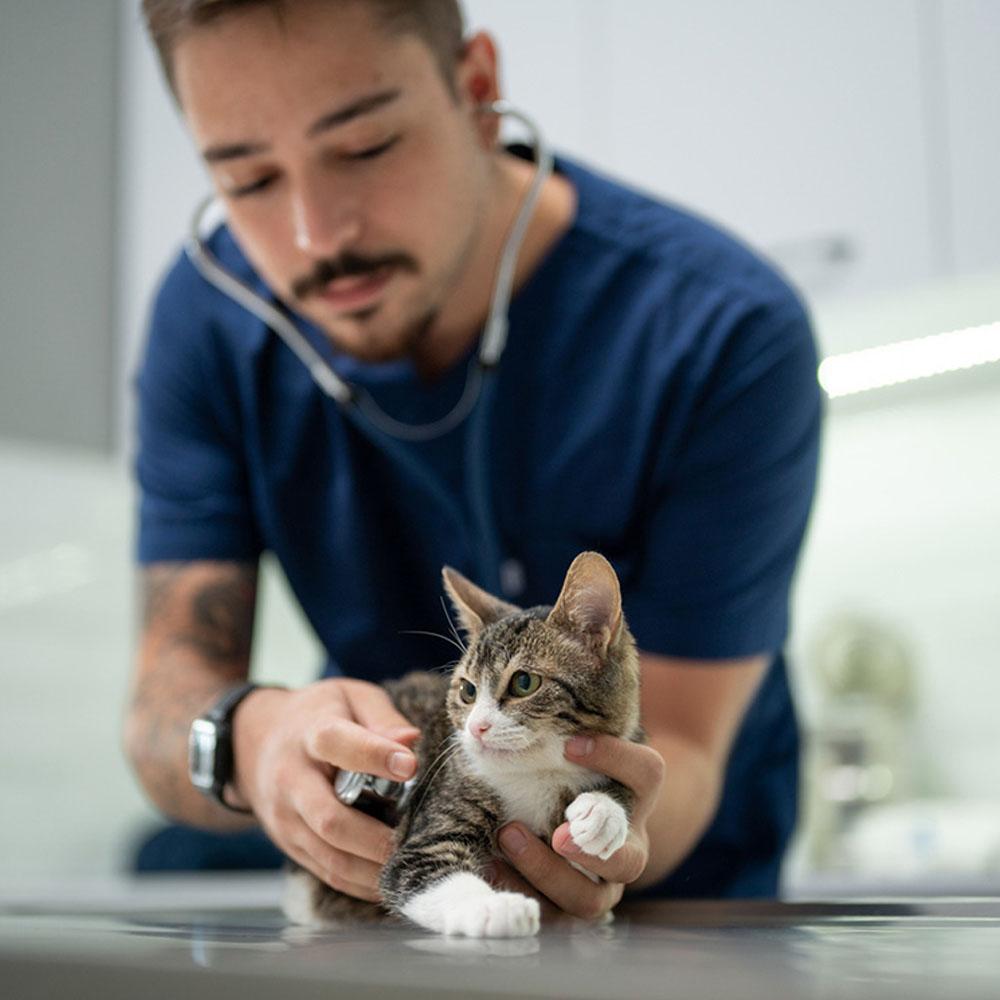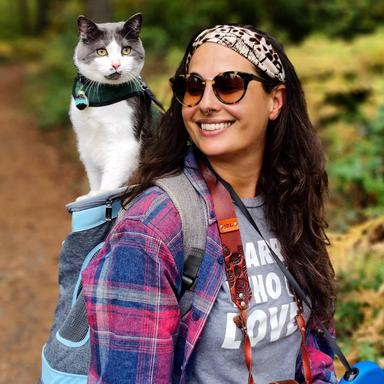Kitten’s First Vet Visit: What To Expect
Preparing for a kitten’s first vet visit. Learn about what you can expect from a vet visit and what you should do to ensure it goes smoothly.
Preparing for a kitten’s first vet visit. Learn about what you can expect from a vet visit and what you should do to ensure it goes smoothly.
by Janelle Leeson, | December 13, 2023

ilkermetinkursova / iStock
Whether you’ve taken a pet to the vet before or not, it’s natural to have some questions about your cat or kitten’s first checkup. The good news is that many pet parents find the first vet visit to be informative, laying the foundation for their cat’s lifelong health. To make the most of the first vet visit, here are some tips.
Before you schedule, gather key information such as your cat’s breed, age, and vaccination records, which should be in the adoption paperwork. While you’ll want to schedule the first vet appointment soon after adoption, give your kitty a few days at home to settle in first. Use a comfy carrier and skip serving a big meal before the visit. Be upfront with your vet about any concerns or behavior issues and follow their advice, including scheduling regular checkups.
With those tips in mind, here’s what to expect at your cat’s first vet appointment, from scheduling to meeting your veterinarian.
Your cat should have their first wellness visit within the first couple of weeks following adoption. However, the timing can vary slightly if your cat requires a longer adjustment period or if they’re due to the vet sooner for a core vaccination or other health concern. Keep in mind that if you plan to purchase pet insurance before your first visit, a waiting period will apply.
After their initial visit, you’ll be going in for checkups at least annually. Kittens completing their vaccination schedule, seniors, and those with existing health conditions will see the vet more often.
Waiting until your cat shows signs of illness isn’t the right time to establish care. The goal of wellness exams is to keep your kitty healthy and get ahead of any conditions before symptoms develop.
Some veterinary offices have a waitlist for establishing care, while others offer immediate appointments. To avoid delays, call to schedule your cat’s appointment before their arrival home.
At the time of scheduling, ask the clinic what to expect during the exam. This guide can give you a general idea of your cat’s first exam. Your clinic will also know what vaccinations are common in your area and what your cat’s lifestyle might call for. This gives you time to research any recommendations and budget accordingly. You can also jot down any questions you’d like answered by your vet.
Pet parents can prepare for their vet’s questions by taking note of the following before the exam:
Eating habits: Your vet will ask what foods your cat eats, how much, how often, and if there have been any changes in appetite.
Bathroom tendencies: Be prepared to describe the stool consistency if you’re unsure what healthy cat poop looks like or if you’ve noticed any changes.
Lifestyle and activity level: Learning about your cat’s everyday life — such as if they go outside and how much they play in a day— will help your vet determine if they’re eating the right amount of food and whether there are any other preventive measures to recommend.
The list of what to bring to your cat’s first vet visit isn’t long, because the most important thing is to get your cat secured in a carrier. However, if you haven’t already electronically forwarded any veterinary records from the shelter, bring those along with you, as well as a fresh stool sample if it was requested at the time of scheduling.
If you’ve jotted down questions or notes about your cat’s day-to-day activities, you’ll want to bring those with you to your first visit as well. Remember, visits with your vet are the best time to ask any questions you might have about cat care or your cat’s specific needs and behaviors.
And don’t forget your cat’s favorite treats. While many veterinary clinics offer tasty snacks, it’s always a good idea to bring a stash. They’ll help distract your kitty during the exam and reward them for a successful visit.
A veterinary nurse or technician will likely start your exam with a few questions about how your cat is doing at home, including their meal and bathroom routines.
Next will be the physical part of the exam carried out by your veterinarian and perhaps another staff member:
Weight check, via a scale
Observing their physique and feeling their ribs to assess their body condition score
Measuring the body temperature through the rectum or ear
Listening to their heart and lungs with a stethoscope
Examining your cat’s eyes, ears, nose, and paws
Examining the skin and fur, potentially combing for fleas and/or dirt
Opening the mouth and feeling the gums
Feeling the lymph nodes, joints, and abdomen
Most veterinarians are happy to explain what they’re doing during the first exam and what role it plays in assessing your cat’s health. Let your vet know if you have additional questions along the way.
The American Association of Feline Practitioners (AAFP) previously reported a troubling trend: While 83 percent of pet parents bring their cats for their first vet visit, less than half return for crucial follow-up care. Here are a few examples of lifelong preventive care your vet might discuss, in addition to the importance of routine wellness visits.
Most vaccinations for cats start when they’re six to eight weeks old, and they’ll require boosters until they’re about 16 weeks old. After that, your cat may need a booster annually or every three years. If your cat or kitten received a vaccination at their visit, your veterinarian will send you home with care instructions, typically to keep an eye on your little one and to give the clinic a call if they seem unwell.
If your vet found signs of dental disease, they may discuss scheduling a dental cleaning under anesthesia. Many cats have more than one cleaning throughout their lives, but you can prevent gingivitis and bad breath by practicing oral care at home.
Your vet will have likely told you that even if your cat is indoor-only, they should be treated with flea preventatives all year round. Spot-on flea treatments (which also typically protect against ticks, heartworms, mites, and other parasites) are applied to your cat’s skin every month to every three months. They require a prescription from your vet.
Unsure what cat veterinarian questions you should ask? Here are a few important questions to get you started:
What is my cat’s ideal weight and daily caloric needs based on their lifestyle?
What is the appropriate type of food for my cat based on their age and health?
What are some tips to keep my cat mentally and physically stimulated, whether I’m home or away for the day?
How much play should my cat get a day?
What vaccinations do you recommend based on my geographic location and my cat’s lifestyle?
Can you demonstrate how to brush my cat’s teeth?
Can you demonstrate how to clip my cat’s nails?
Why is my cat [doing this]?
How often should my cat have a routine checkup and what can I expect during future visits?
The cost of an initial cat vet visit depends on your geographic location and the services your cat requires. Some clinics charge extra fees to establish care while others charge a flat fee for all wellness visits. Generally, cat exams range from $50 to $90 and vaccines from $20 to $60 each. Purchasing pet insurance before your first exam may help cover some expenses.
Building a rapport with your veterinarian is crucial for your cat’s wellbeing. Regular checkups can detect diseases early, potentially adding years to your cat’s life and even saving you money on healthcare down the road. Plus, preventive care improves your cat’s life by keeping them feeling their best. Establishing care soon after your new cat arrives home offers an opportunity to learn how best to care for your cat. Because kittens need a lot from their vet, you’ll have plenty of opportunities to get to know them.
The American Animal Hospital Association (AAHA) and the AAFP recommend that all cats be seen by their vet at least once per year. Kittens need more frequent visits for their initial vaccines, and senior cats often benefit from bi-annual exams. Cats with health issues or behavioral concerns may also require frequent vet visits. Talk with your veterinarian to determine the best schedule for your cat.
While the annual cost of raising a cat can vary widely ($1,149 to $3,600), it’s important to budget for essential medical care alongside food and toys. Pet insurance can help cover unexpected emergencies and treatments, and some policies may even partially cover preventive care. However, depending on your cat’s age, pre-existing conditions, and budget, pet insurance might not be the best fit.
If that’s the case, consider pet wellness plans, which are typically more affordable and only cover essential care such as annual exams. Ultimately, whether you choose to purchase pet insurance, a wellness plan, or go without coverage, an emergency pet care fund can help you budget for vet expenses and unexpected vet bills.
Make vet visits less stressful by choosing a feline-friendly and fear-free certified vet, skipping meals just before the visit, gradually counterconditioning and desensitizing your cat to their carrier and the car, and using a pheromone spray. If your cat still shows signs of stress, your vet can prescribe a medication to help them relax. Alternatively, consider a mobile vet service, where the vet comes to your home for a low-stress exam.

Janelle Leeson is a Portland, Oregon-based freelance writer. Her work has been featured in magazines such as Inside Your Dog’s Mind, Inside Your Cat’s Mind, and Paw Print, as well online at Insider Reviews, NBC Select, Shop Today, PetMD, and Daily Paws. She has two adventure cats, a flock of urban chickens, and a soon-to-be-husband who doesn’t mind housing the occasional foster cat — or five.